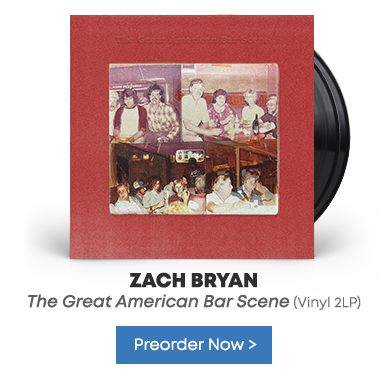Led Zeppelin's monumental live album How the West Was Won, originally released in 2003, is not only a document of a band in its prime but a nod to an era when rock n' roll was king and a guitarist and vocalist could trade volleys throughout the course of a concert. The band – Robert Plant, Jimmy Page, John Paul Jones, and John Bonham – performed the songs included on the set during a Southern California stint in the summer of 1972. Ultimately, How the West Was Won comes on as the sound of a group in complete control of its power, and with a stunning ability to connect the dots from the blues to undiscovered hard-rock frontiers. In celebration of the album seeing its first-ever appearances on vinyl and Blu-ray, we look at five of the many reasons the record is a must for any music fan.
"Black Dog"
Arriving as it does relatively early in How the West Was Won, "Black Dog" captures what was no doubt one of the more furiously intense opening sequences of a rock concert. This version in particular, with its stop-and-start nature and ascending instrumentation, heralds a band that prized tempo, space, and finesse. It also makes clear that Led Zeppelin emphasized interplay at its most concentrated. Compared to the 1971 original. the group mixes things up – namely, and most notably, the intro. While the lead-in on the studio version seems soft and drone-like, Led Zeppelin just goes for it here. The first 10 seconds of the live take presaged decades of thrash metal, with the guitars locking in for a jagged joyride. Then somehow, majestically, it stops on a dime for Plant's blood-curdling, high-pitched vocals.
"Dazed and Confused"
Settle in. A svelte six minutes and change on record, "Dazed and Confused" – a reworking of a folk-rock track from Jake Holmes that appears on Zeppelin's 1969 debut – often swelled to epic lengths live. The version on How the West Was Won clocks in at 25 minutes, shorter than other live takes that stretch well beyond a half hour. What becomes evident is how well Led Zeppelin could work a groove. Page's guitar workouts rightfully get all the accolades, but the twists and turns – from psychedelic howls courtesy of a violin bow to freak-funk breakdowns – wouldn't hold together without a fluid, flexible supporting cast. The song and, with it, Page's devil-may-care-attitude, emerges from a swampy, mysterious sludge. By the time the mayhem runs its course, including Plant's improvisational scatting, the band and audience seem ready to return to the darkness.
"Heartbreaker"
Originally found on the band's 1969 sophomore effort, the studio version of "Heartbreaker" is all about serendipity. A little more than halfway through the song, all backing instrumentation halts, Plant's vocals go MIA, and Page fires off an unexpected solo. In concert, Led Zeppelin embraced the tune's oddity – as well as the group's own self-mythologizing. Here, Page extends the solo, adds more 50s kick, and manages to quote a bit of Bach. Why? Why not. It's a gesture from a band whose members not only knew they were giants but had no shame and weren't above having a little fun.
"Going to California"
An exquisite number live and on record. While the version here does not drastically differ from the 1971 studio take, the band stretches it out a couple more minutes and lets Plant get more impassioned with the vocals. The arrangement on How the West Was Won remains worth singling out for a number of reasons. One, it effortlessly transitions form "Stairway to Heaven" into a more subdued side of Led Zeppelin and leads into the even softer "That's the Way." The pattern makes for rather brilliant concert sequencing, and sets up the chaos that follows. Additionally, Jones' intricate and hypnotic mandolin work moves to the forefront, a small shift that reflects the lyrics' mix of heartache and confusion all the while addressing the song's sense of mysticism.
"Bring It on Home"
It wouldn't be a Led Zeppelin concert worth championing without some blues. Although, is this really the blues? What starts as homage to the Willie Dixon original, complete with a harmonica that would be right at home in Louisiana, soon builds into something more ferocious. And then keeps building. Throughout the course of the song's nine minutes, the band throws log after log on the fire until Dixon's blues is completely unrecognizable. Near the two-minute mark, Page takes control of the track and never lets it out of his grip. So long blues, hello heavy metal. Well, not quite, as Led Zeppelin takes us on a journey, slowing the song down to let Jones strut into a groove. Moments later, the rumble again erupts before the concert finishes. We are left wanting more.
23rd Mar 2018




































